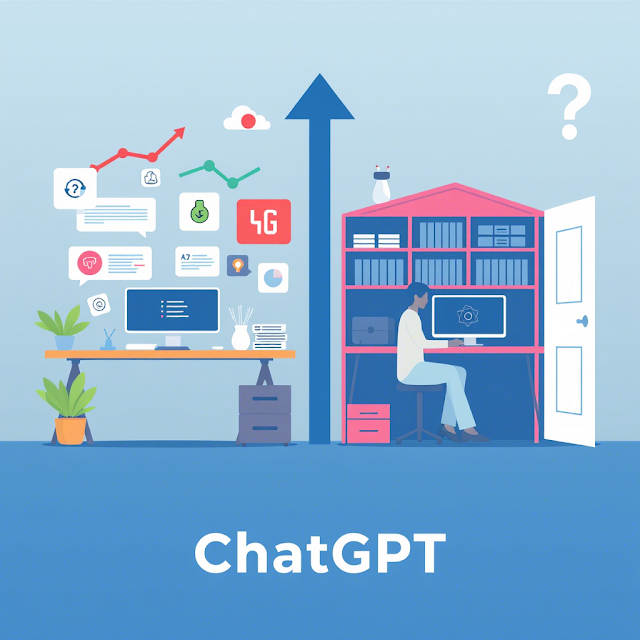In recent years, artificial intelligence (AI) has emerged as a transformative force across various sectors, with tools like ChatGPT leading the charge. While these technologies offer unprecedented opportunities for innovation and efficiency, they also raise significant concerns about their implications for society. This article explores the dual nature of AI tools, examining the potential threats they pose and the opportunities they create, along with solutions to mitigate the risks.
Understanding AI Tools
What is ChatGPT?
ChatGPT is a state-of-the-art language model developed by OpenAI. It utilizes natural language processing (NLP) to understand and generate human-like text based on the input it receives. This technology can be applied in various contexts, including customer service, content creation, and education.
The Rise of AI Tools
The rapid advancement of AI tools has been fueled by:
- Increased Data Availability: The explosion of data generated by users provides AI systems with the information needed to learn and improve.
- Enhanced Computing Power: Modern hardware allows for more complex algorithms and faster processing times.
- Growing Demand for Automation: Businesses are increasingly seeking ways to automate tasks to improve efficiency and reduce costs.
For more insights on how AI can transform your business, check out this article on Milyarder Blog.
The Opportunities Presented by AI Tools
1. Enhanced Efficiency
AI tools like ChatGPT can significantly enhance efficiency in various sectors:
- Automation of Routine Tasks: By automating repetitive tasks, businesses can free up valuable time for employees to focus on more strategic activities.
- Improved Customer Service: AI chatbots can handle customer inquiries 24/7, providing instant responses and improving customer satisfaction.
2. Cost Reduction
Implementing AI tools can lead to substantial cost savings:
- Reduced Labor Costs: Automating tasks can decrease the need for human labor, leading to lower operational costs.
- Minimized Errors: AI systems can reduce human error, resulting in fewer costly mistakes.
3. Data-Driven Insights
AI tools excel at analyzing large datasets, providing valuable insights that can inform decision-making:
- Predictive Analytics: Businesses can use AI to forecast trends and customer behavior, allowing for more informed strategic planning.
- Personalization: AI can analyze customer data to deliver personalized experiences, enhancing customer loyalty and engagement.
For further reading on AI applications, visit Top 10 AI Applications You Can Use In Healthcare.
The Threats Posed by AI Tools
1. Job Displacement
One of the most significant concerns regarding AI tools is the potential for job displacement:
- Automation of Jobs: As AI systems become more capable, they may replace human workers in various roles, leading to unemployment and economic inequality.
- Skill Gaps: Workers may find it challenging to adapt to new technologies, resulting in a workforce that lacks the necessary skills for emerging job opportunities.
2. Privacy Concerns
The use of AI tools raises serious privacy concerns:
- Data Collection: AI systems often require vast amounts of data, which can lead to the unauthorized collection and misuse of personal information.
- Surveillance: The implementation of AI in surveillance systems can infringe on individual privacy rights, leading to a society where people are constantly monitored.
3. Ethical Dilemmas
AI tools can present various ethical dilemmas:
- Bias in Decision-Making: AI systems can perpetuate existing biases present in the data they are trained on, leading to unfair outcomes in areas such as hiring and law enforcement.
- Accountability: As AI systems make decisions, questions arise about who is responsible for those decisions, particularly in cases of error or harm.
For more information on the ethical implications of AI, visit Negative Impacts of AI: Is This Technology Dangerous for the Future?.
Addressing the Challenges of AI Tools
1. Reskilling the Workforce
To mitigate the impact of job displacement, it is essential to invest in reskilling programs:
- Training Initiatives: Organizations should provide training for employees to help them adapt to new technologies and acquire the skills needed for emerging roles.
- Lifelong Learning: Encouraging a culture of continuous learning can help workers stay relevant in a rapidly changing job market.
2. Implementing Data Privacy Regulations
To address privacy concerns, governments and organizations must establish robust data privacy regulations:
- Data Protection Laws: Implement strict guidelines for data collection, storage, and usage to protect individuals' privacy rights.
- Transparency in Data Usage: Organizations should clearly communicate how they collect and use data, ensuring that users are informed and can provide consent.
3. Promoting Ethical AI Development
To tackle ethical dilemmas, it is crucial to prioritize ethical considerations in AI development:
- Bias Mitigation Strategies: Developers should implement strategies to identify and reduce bias in AI algorithms, ensuring fair outcomes across different demographics.
- Accountability Frameworks: Establishing clear accountability frameworks can help determine responsibility for AI-driven decisions, fostering trust in these technologies.
For insights on how AI can help your business grow, check out How AI Can Help Your Business Grow.
Conclusion
AI tools like ChatGPT present both significant opportunities and challenges. While they can enhance efficiency, reduce costs, and provide valuable insights, they also pose threats such as job displacement, privacy concerns, and ethical dilemmas. By addressing these challenges through reskilling, implementing data privacy regulations, and promoting ethical AI development, we can harness the potential of AI tools while mitigating their risks. The future of AI holds great promise, and it is essential to navigate its complexities thoughtfully to create a beneficial impact on society.
